A boy smiles as he carries his dog to a Sulala Animal Rescue pop-up clinic at a refugee camp. Gaza Strip, State of Palestine, 2024.
Mahmoud Abu Hamda / Sanctuary Doc / We Animals
Photographer: Mahmoud Abu Hamda
Story in collaboration with Sanctuary Doc, a nonprofit multimedia project telling visual stories of compassion for animals amidst our world’s biggest challenges.
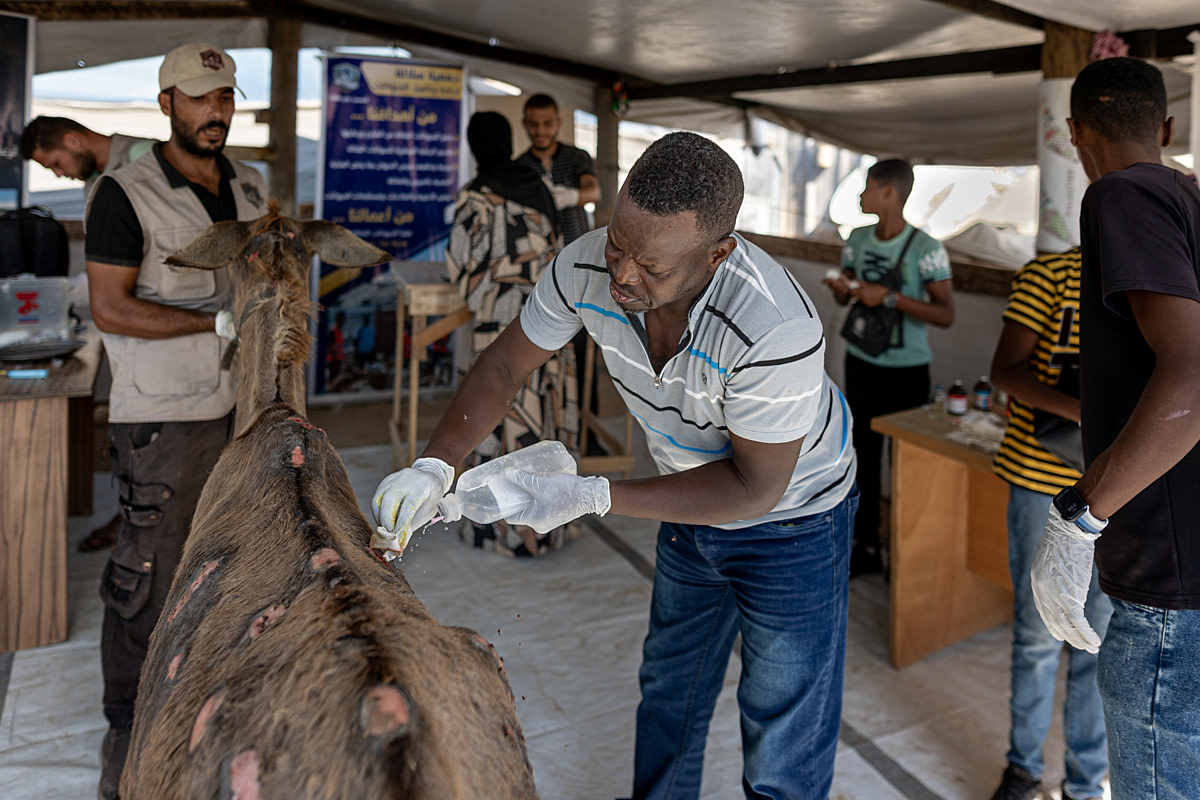
Sulala Animal Rescue founder Saeed Al-Err and a volunteer treat an injured donkey in the organization’s pop-up clinic at a refugee camp. Sulala Animal Rescue is one of the only functioning animal rescues in Gaza and had to relocate from northern to central Gaza after the area was invaded by Israeli forces in October of 2023. Gaza Strip, State of Palestine, 2024.
A Brief Respite
Rouh races across the sand and seashells while her human companion stands nearby, both soaking in moments of serenity offered by the Mediterranean Sea. Once a tiny, flea-infested puppy found wandering through a refugee camp, Rouh is now older, stronger, more vibrant—running freely beside Sa’ed, the son of Sulala Animal Rescue’s founder, Saeed Al Err. Rouh and Sa’ed’s bond is unmistakable: a quiet love emerging through the tragedy of war.
Rouh means “soul” in Arabic, and soul is the one thing Palestinians still hold onto. She represents more than a single rescued dog; she embodies the spirit of survival, care, and companionship. In Gaza, the soul—rouh—lives not only in its people, but in the animals they refuse to abandon.
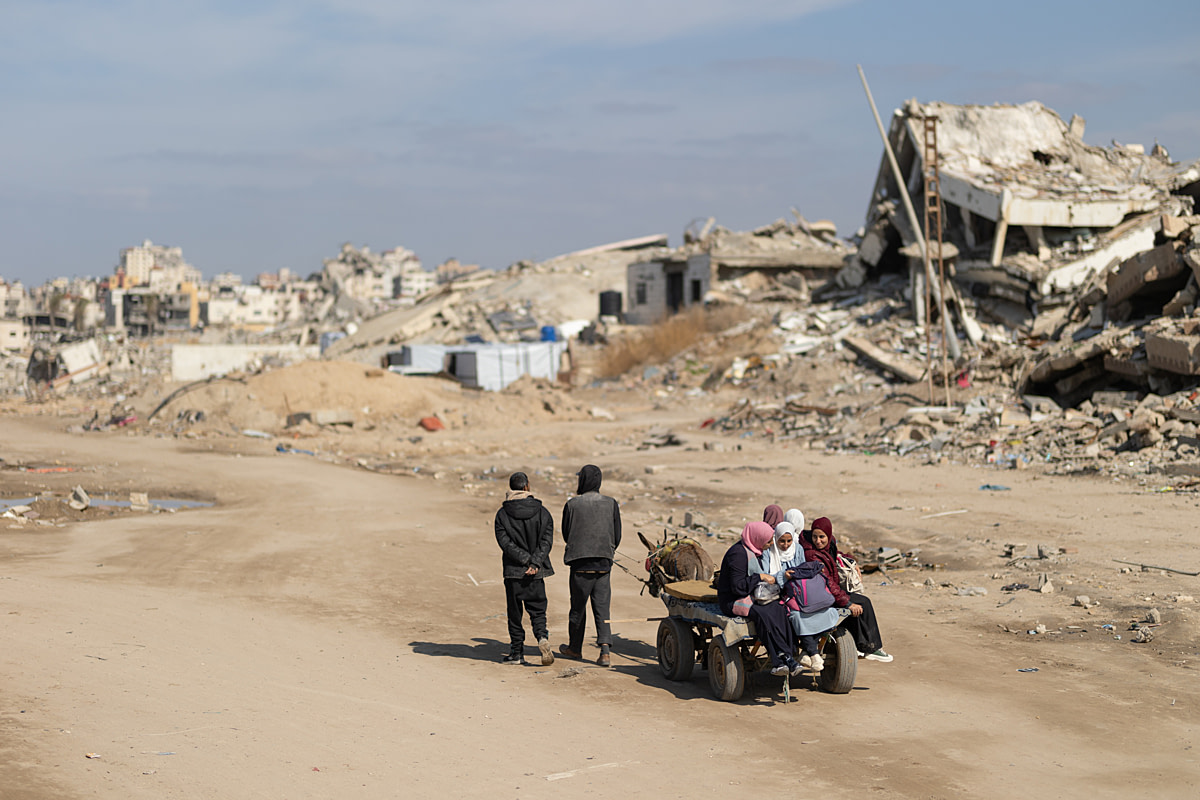
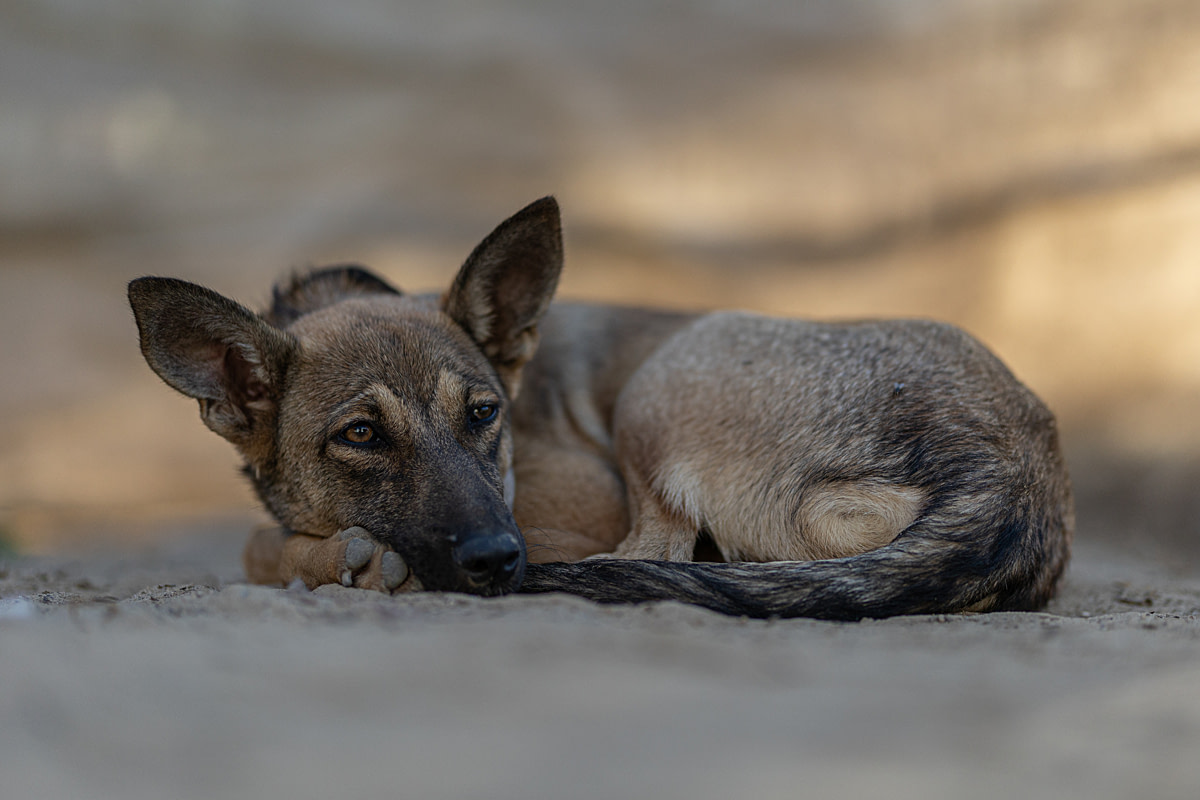
But on this day, Sa’ed is simply watching Rouh run down the beach. For a moment, there is levity. There is hope.
Centering the Animals
The suffering of animals deepens the grief of the people in Gaza. They cannot look away—and yet, they cannot always help. The war on Gaza is not only a war on its people; it is a war on every living being who once knew a different Palestine. A war on dogs and donkeys, cats and camels, birds, trees, soil, air—on life itself.
What would it mean to center the animals? To account for their illnesses, their injuries, the loads they carry, their thirst and hunger, their fear?
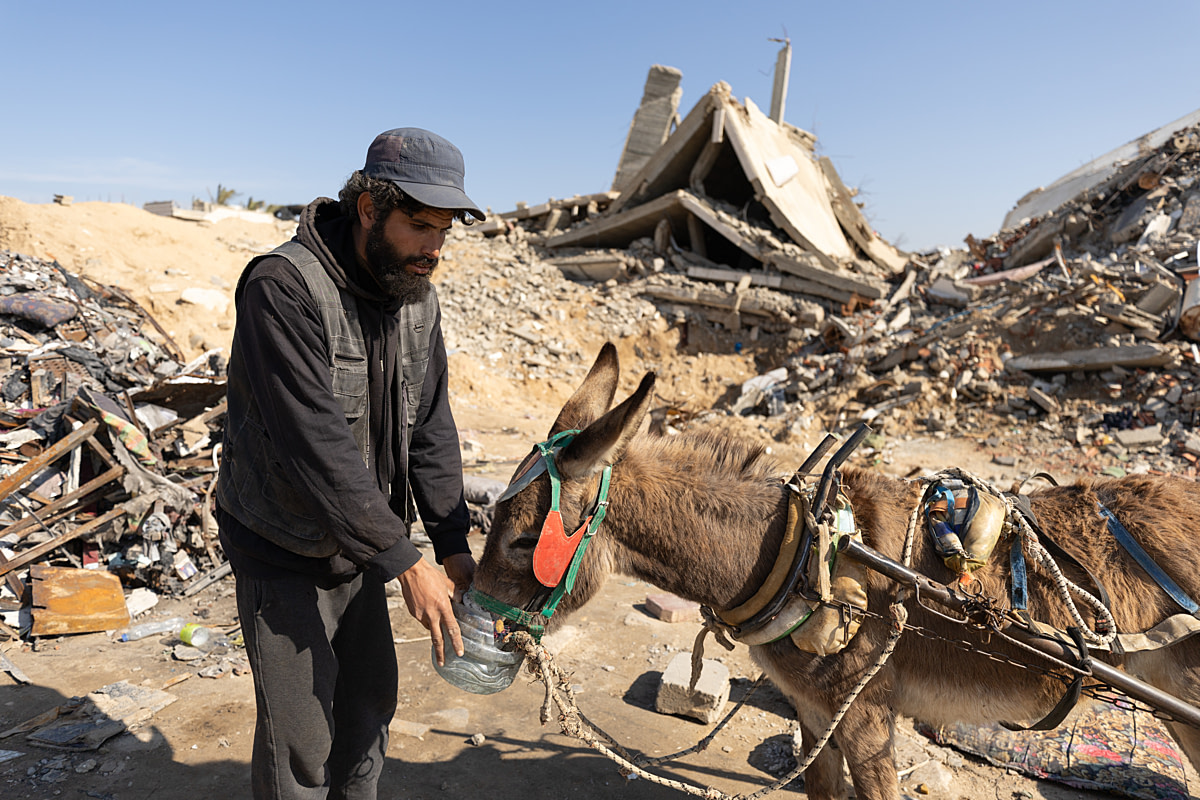
Younis Al-Tallaa holds a makeshift water container for the family donkey, who takes a drink, while the pair stand near the rubble of destroyed buildings. After their home was destroyed in the Gaza war, Younis and his brother Mahmoud work with their donkey daily to transport displaced people across the Gaza Strip. The animal remains their only source of income, and the brothers ensure their donkey has food, water and rest amid the difficult humanitarian conditions. Undisclosed location, Gaza Strip, State of Palestine, 2025.
One of the most moving aspects of Sulala’s work is that, while others may consider some animals more important than others, there is no hierarchy at Sulala’s clinics and medical points. A donkey is not more or less important than a dog. An injured puppy and an overworked horse are equally deserving of compassion and care. That simple ethos—an animal in need is an animal in need—is a testament to Sulala’s commitment to helping as many animals as possible.
During the 42-day ceasefire that began on January 19th, 2025, one aid truck from Animals Australia—held at the border for months—finally made it through. It was a cause for celebration. The Sulala team, who had been feeding animals with beans and other canned items, were able to provide people’s companion and working animals with more nutritious food. To the staff and volunteers, it felt like a miracle.
But when the ceasefire ended, the toll—both physical and psychological—on people and animals grew heavier. Conditions worsened: food prices skyrocketed, and the needs of both animals and humans became more dire. Sulala gives whatever they can—education for children, veterinary and medical care, food, clean water. While the infrastructure of Gaza collapses, they create refuge. They have become sanctuary.
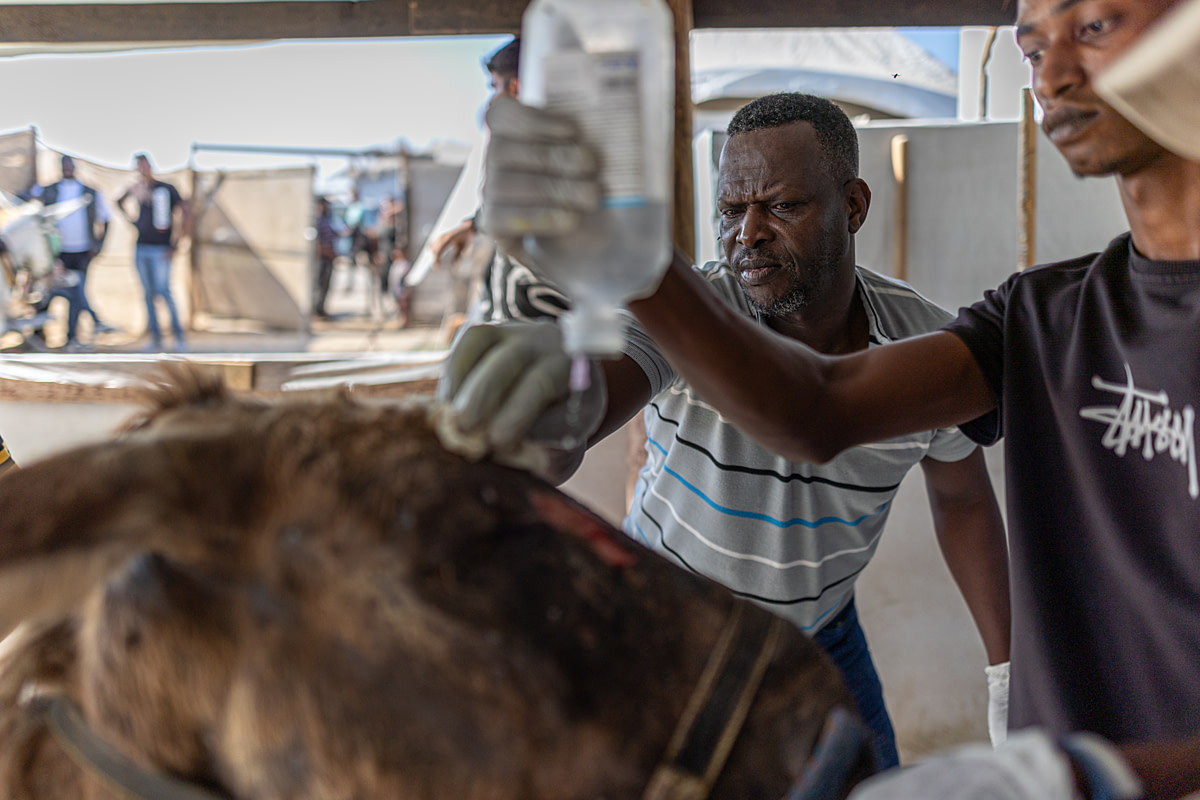
Sulala Animal Rescue founder Saeed Al-Err and a volunteer treat an injured donkey at the organization’s pop-up clinic at a refugee camp. Sulala Animal Rescue is one of the only functioning animal rescues in Gaza and had to relocate from northern to central Gaza after the area was invaded by Israeli forces in October of 2023. Gaza Strip, State of Palestine, 2024.
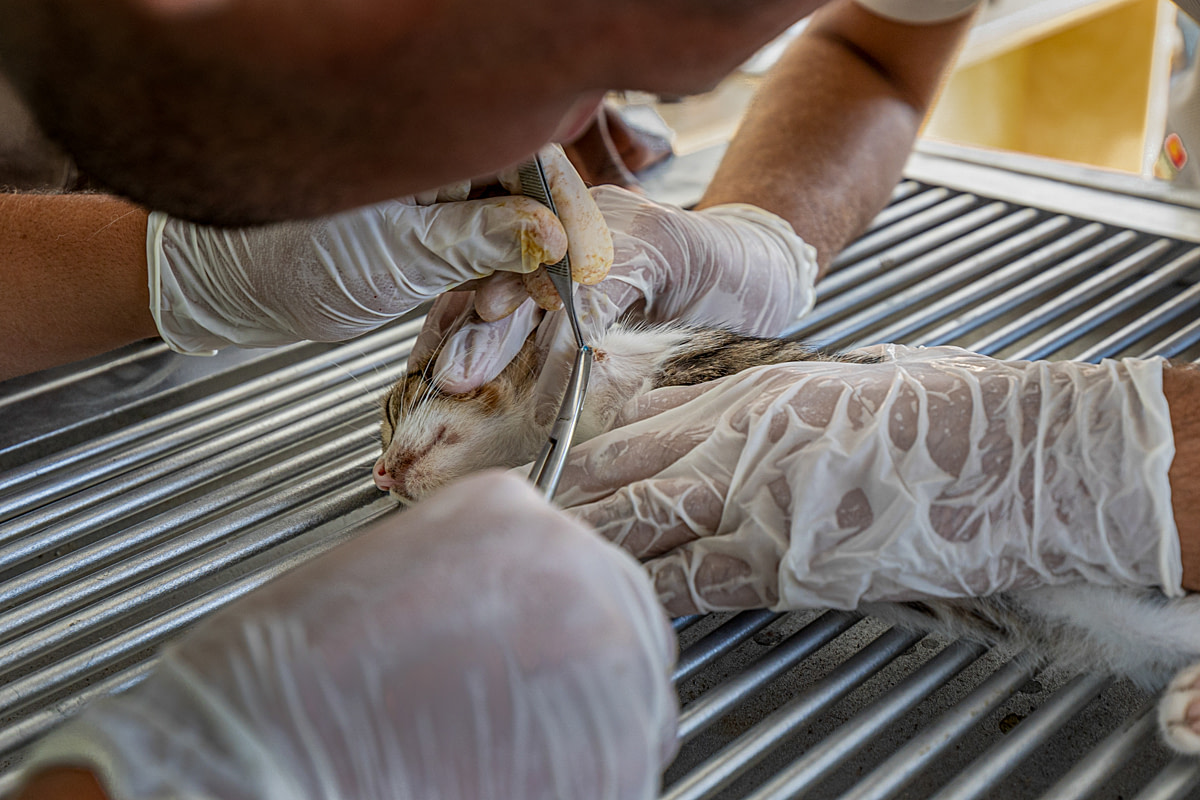
A domestic cat receives veterinary treatment from Sulala Animal Rescue pop-up clinic team members at a refugee camp. Gaza Strip, State of Palestine, 2024.
Saeed Al-Err, founder of Sulala Animal Rescue, speaks to the psychological toll of war on animals:
“When it comes to the animals, they are scared when they hear an airplane. Whenever a plane flies over, they run and try to hide. When there are bombs, they are even more frightened—even those with us in the house. The cats in the shelter—the chalet—when outside and hearing a plane, run inside. Both cats and dogs… Not all like being inside; some prefer to play and run outside. But when there’s a plane, they run to the doors or windows, and we let them in.”
Saeed continues, “Many animals are injured—often lightly. You can tell they were exposed to bombing but didn’t sustain wounds or fractures. Sometimes you see signs of explosions on their skin and fur, like ashes.”
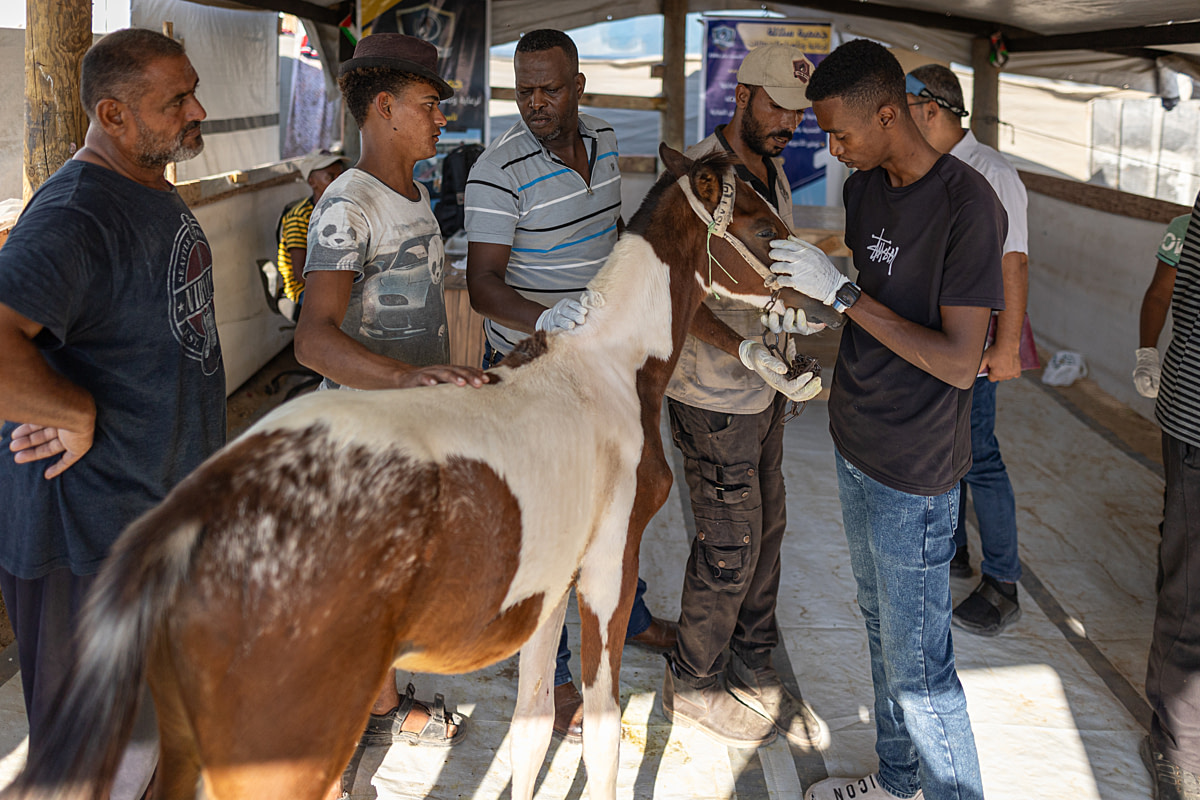
A horse is examined by Sulala Animal Rescue founder Saeed Al-Err and team members in the organization’s pop-up clinic at a refugee camp. Gaza Strip, State of Palestine, 2024.
A Widening Circle of Compassion
Compassion often begins in the places closest to our hearts—sometimes with animals, sometimes with people. For Gazan photojournalist Mahmoud Abu Hamda, it begins with the people, their suffering, and the monumental losses and challenges they face every day. However, it is possible for our circle of compassion to widen, even in a place of total devastation.
Through photographing the animals at Sulala’s clinic and interviewing two refugees with their beloved donkey, Mahmoud’s eyes and heart opened to include the animals and how they, too, face unbearable suffering, and sometimes, death. His work reveals the interconnectedness of all life.
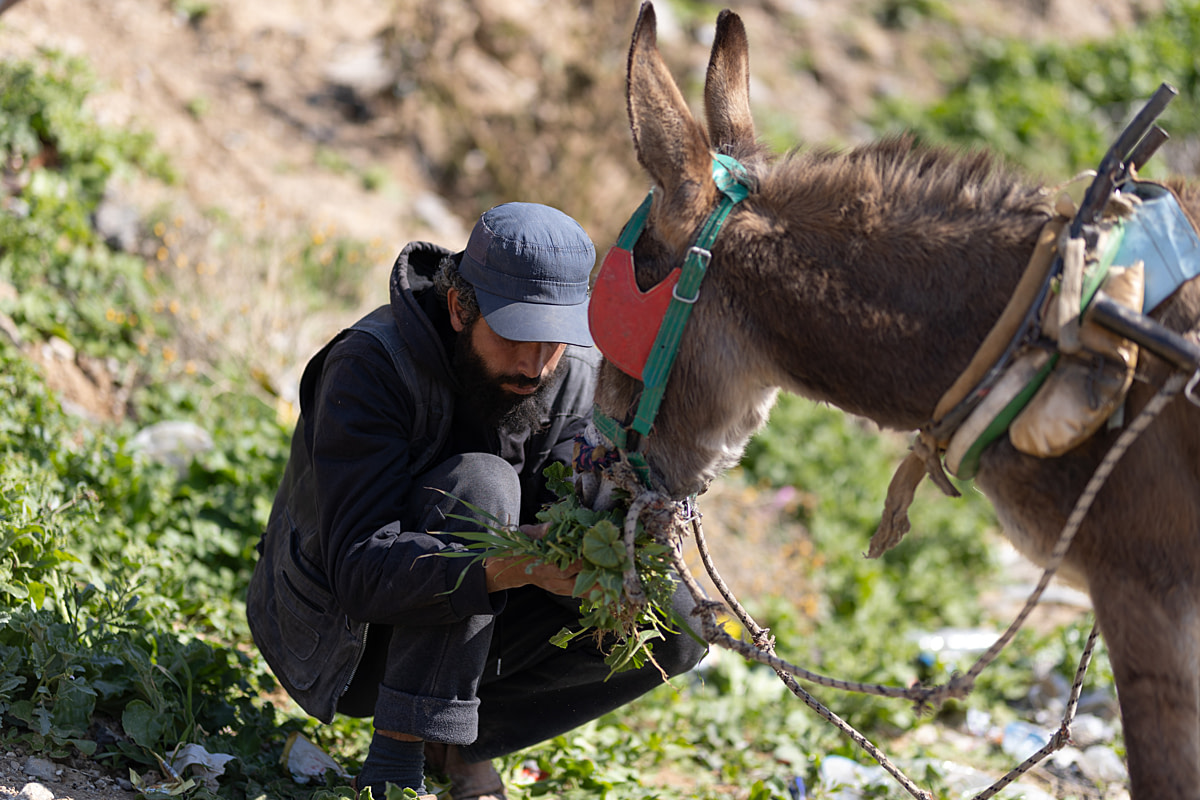
Younis Al-Tallaa feeds his donkey freshly picked herbs he has just gathered during a stop in an open field. After Younis’ family home was destroyed in the Gaza war, he works with his donkey daily to transport displaced people across the Gaza Strip. He considers the donkey a vital partner in earning a living, providing them daily with proper food, clean water and a comfortable place to rest. Undisclosed location, Gaza Strip, State of Palestine, 2025.
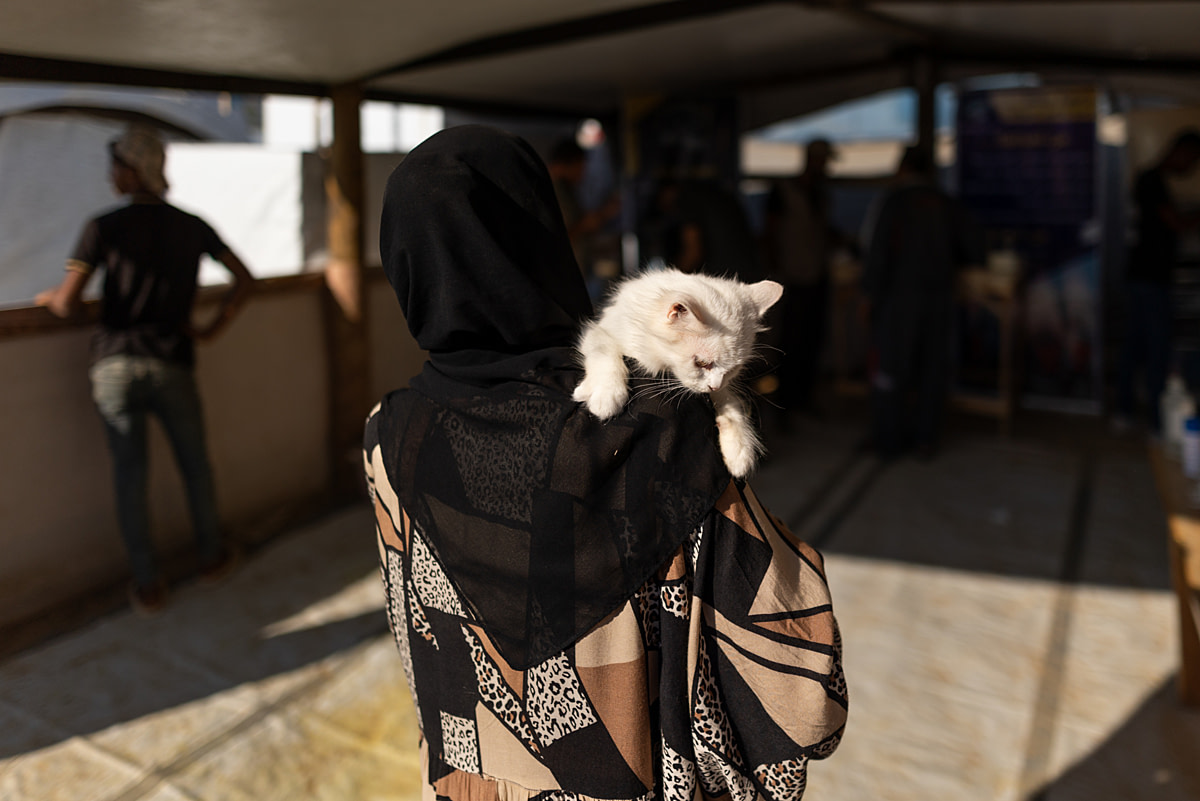
A woman carries her cat upon her shoulder to the Sulala Animal Rescue pop-up clinic at a refugee camp. Gaza Strip, State of Palestine, 2024.
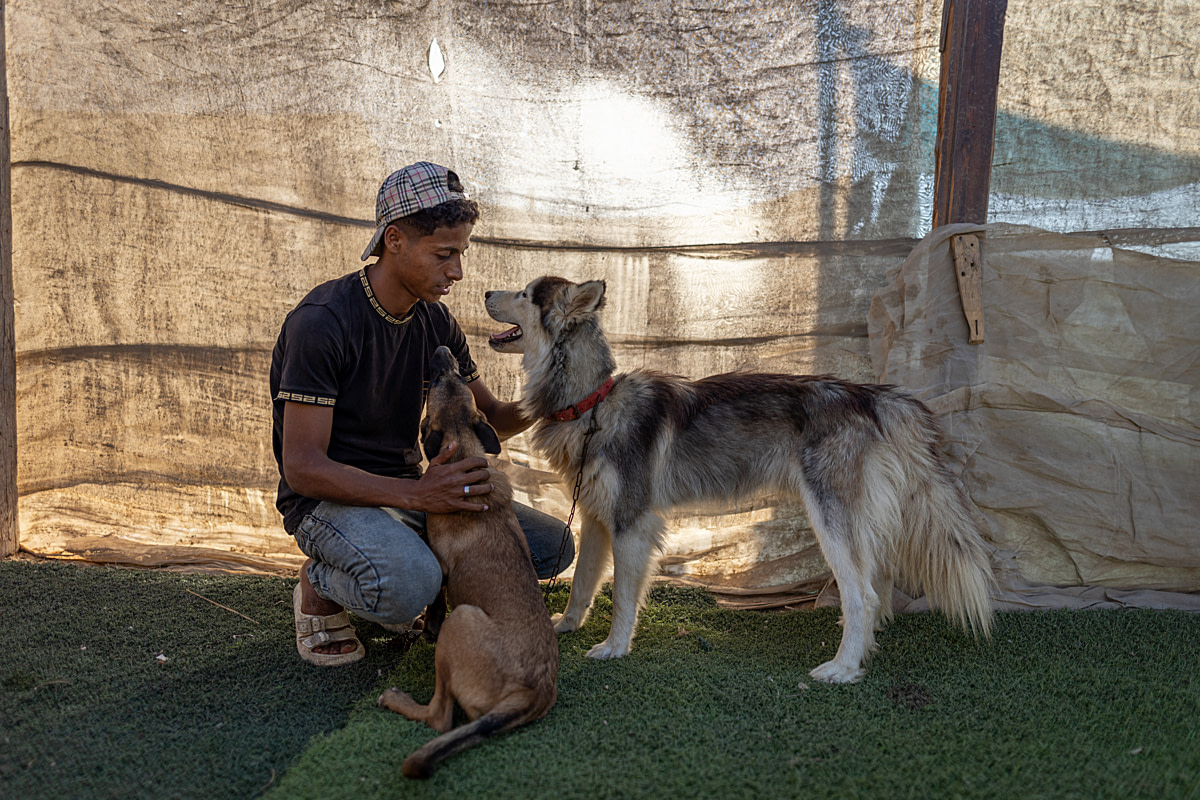
Perhaps this is the essence of compassion itself – to accompany one another in despair and difficulty, no matter where, or who, they are.
For Mahmoud, witnessing these animals profoundly shifted his view:
“My perspective has changed significantly, especially toward animals. I’ve come to see that animals—particularly those used for transportation, like horses and donkeys—hold great importance. They are not merely means of transportation; they are souls who deserve care and attention.”
In Gaza, the suffering of animals is often invisible—overshadowed by the sheer scale of human loss and destruction. Yet animals endure the same horrors: bombing, displacement, hunger, and disease.
Two Brothers and A Donkey
“My pet is The Donkey,” Younis said. “I share a strong bond with it — it is more than just an animal. I fear for its safety during the war due to bombings and sudden explosions, as well as the lack of available food, harsh weather conditions, and the rough roads it must travel on, which may affect its health and endurance.”
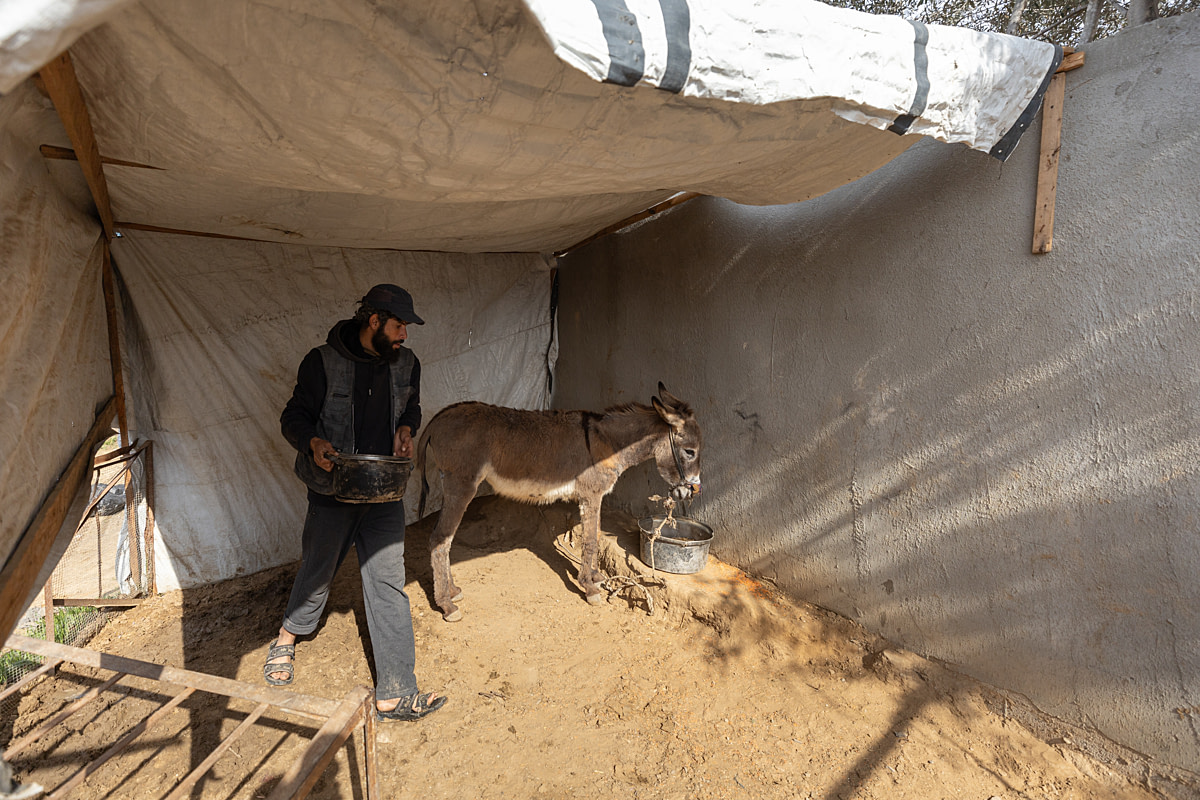
Younis Al-Tallaa carries a water container towards his donkey inside his temporary shelter. After being displaced from a refugee camp when his home was destroyed in the Gaza war, Younis set up a simple shelter for himself, his family and their donkey. Every morning, he ensures the donkey is fed and given water before starting a day of transporting displaced people, believing that properly caring for their donkey is essential for the animal to perform the work. Undisclosed location, Gaza Strip, State of Palestine, 2025.
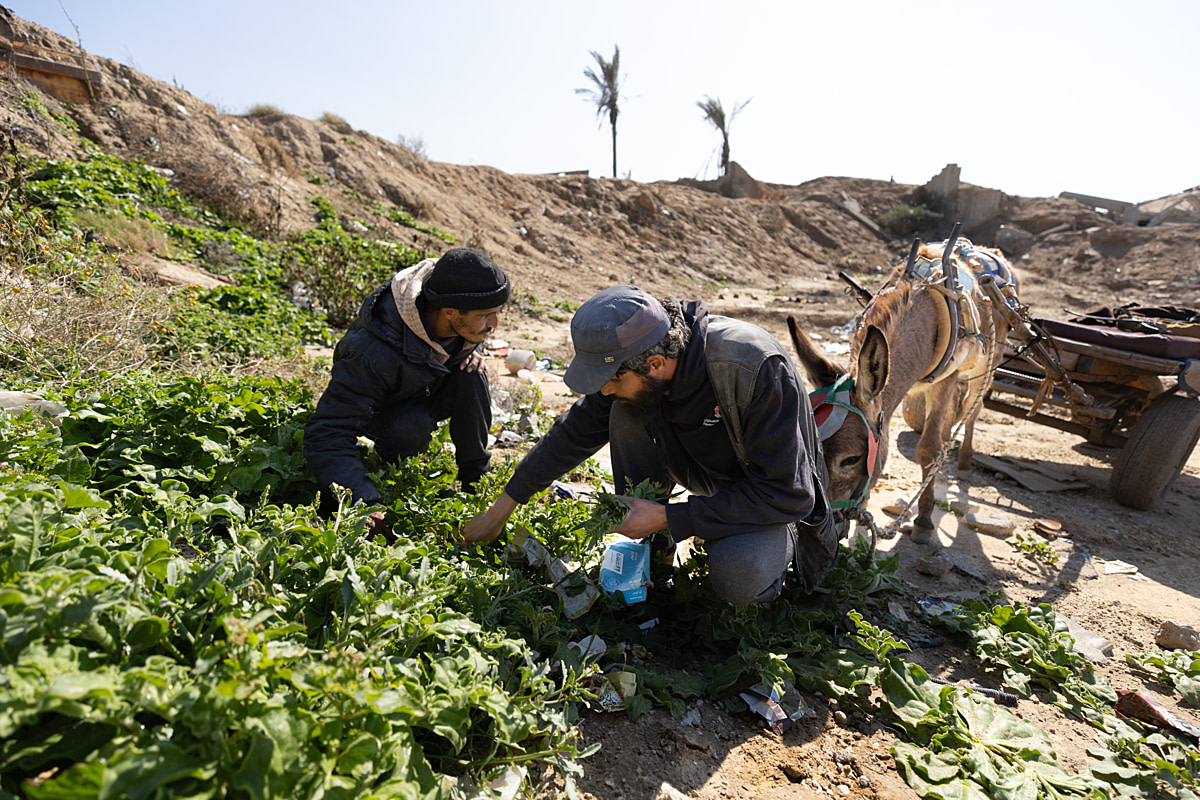
Their donkey has been both a lifeline and a companion. Younis continues, “During one of our displacements, when we loaded our belongings onto The Donkey’s cart and embarked on a long journey, fleeing from the threat of death, I looked into my brother’s eyes and said, ‘If The Donkey were not with us, our situation would have been much worse.’ Its presence alongside us was like that of a true friend in the midst of crisis and severe hardship, bearing a heavy burden on our behalf. In the days leading up to that moment, I was constantly gripped by fear and a lack of safety for several reasons: first, the war itself, and secondly, my deep concern for The Donkey, who means a great deal to me.”
With fuel unavailable and roads turned to rubble, donkeys have become essential. “People rely on them now, more than ever,” photojournalist Mahmoud Abu Hamda explained.
The brothers’ entire family agrees on The donkey’s value–not just for their labour, but for their life. “All the members of my family agreed on the importance of taking extreme care of The Donkey for several reasons. First, because it is a living creature that carries a spirit like any other being, and secondly, because it is one of the vital means of survival during displacement; we rely on it to carry our belongings and necessities when moving from one place to another.”
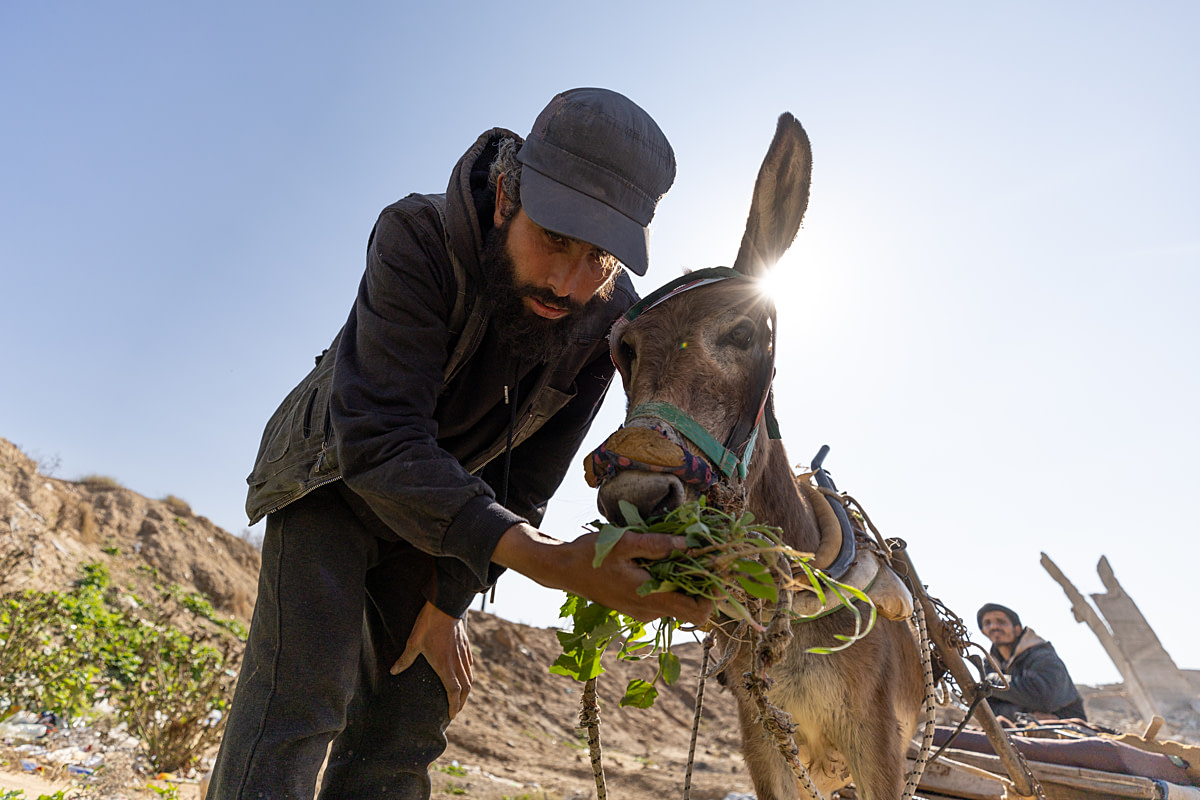
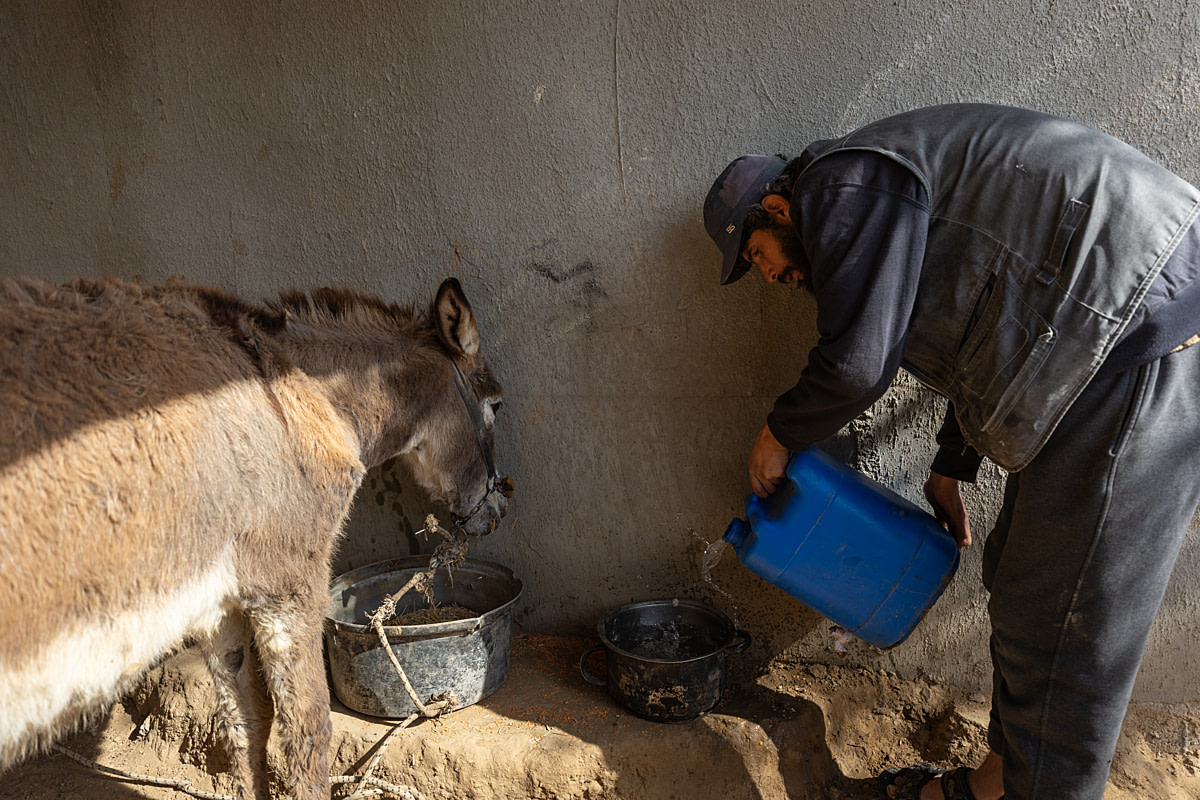
Younis Al-Tallaa pours water into a container for his donkey to drink before they head out to work transporting displaced people. After his home was destroyed in the Gaza war, Younis remains committed to providing his donkey with comfortable shelter, food and water, showing deep care for the animal as an essential partner in earning a living amid the harsh humanitarian conditions. Undisclosed location, Gaza Strip, State of Palestine, 2025.
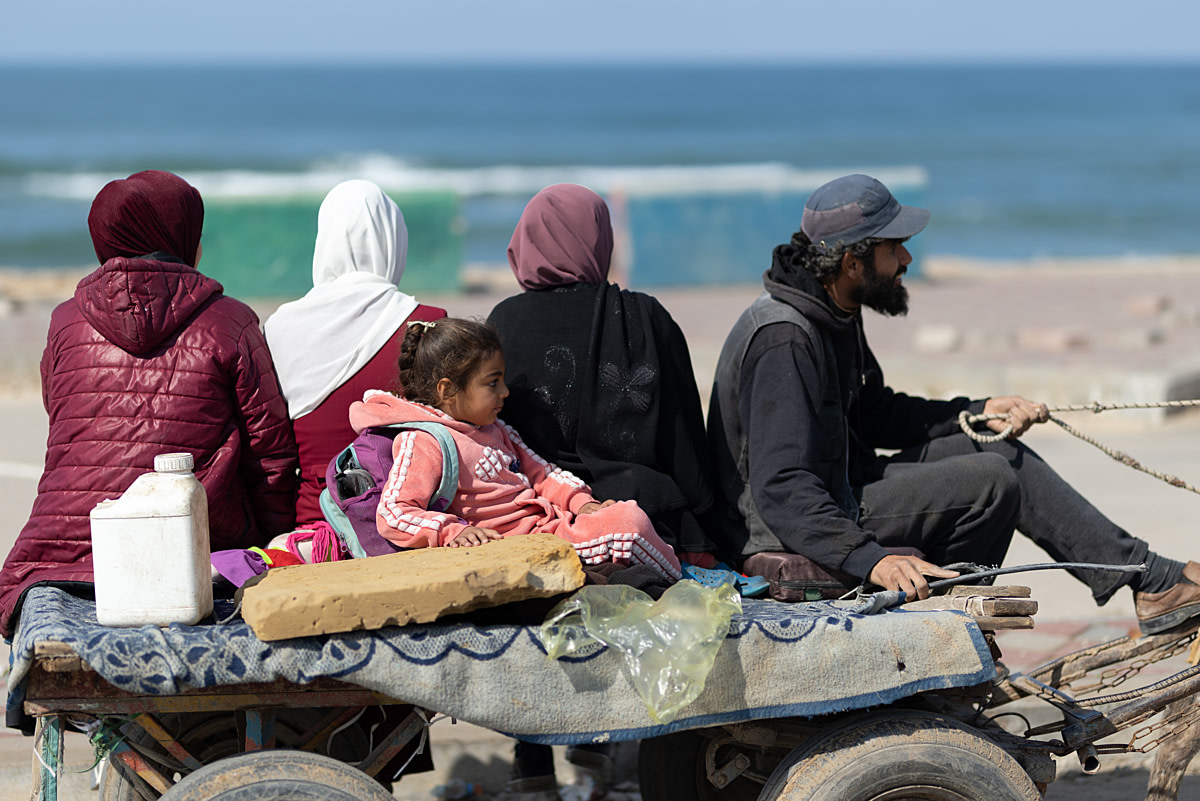
A displaced family sits on Younis Al-Tallaa’s donkey-drawn cart as they travel along a coastal road. Younis and his family were also displaced from a refugee camp after their home was destroyed in the Gaza war. He and his donkey work daily transporting other displaced people, with Younes taking special care of the donkey who serves as his only source of livelihood. Undisclosed location, Gaza Strip, State of Palestine, 2025.
Younis recounted a moment that deepened his sense of responsibility:
“Once, during a bombing in one of the camps that resulted in the deaths of many people, I came across a dead donkey lying by the roadside. At that moment, I felt an extraordinary shock and wondered if the same fate could befall my donkey. This incident only strengthened my determination to protect it at all costs, as it represents a spirit and an integral part of who I am—a symbol of resilience and defiance against the harsh reality.”
But survival has not come easily. “I recall many occasions when I had to buy only a small amount of food for myself to save money, so that I could also afford food for The Donkey, enabling us all to survive and remain healthy,” Younis said.
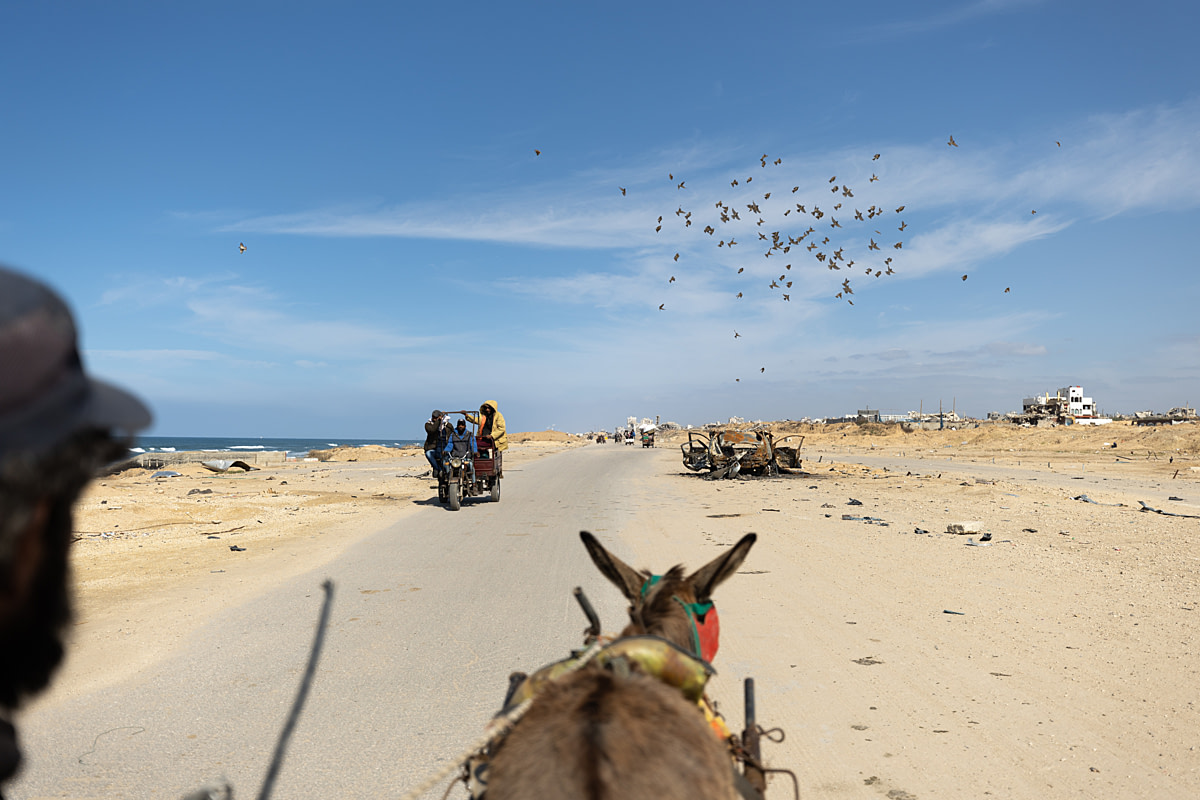
A burned-out car sits abandoned along the coastal road as a flock of birds fly above. The vehicle, reduced to a charred shell, is a stark reminder of the ongoing destruction caused by the Israeli Palestinian conflict. The surrounding area is barren, with debris scattered across the ground, highlighting the widespread devastation in Gaza as civilians endure the harsh realities of the crisis. Undisclosed location, Gaza Strip, State of Palestine, 2025.
Mahmoud stresses the indispensable role of working animals in Gaza:
“Caring for donkeys, in particular, is extremely important, as they’ve played a crucial and challenging role under harsh conditions, assisting people to safely evacuate and move during war and chaos. Therefore, we must appreciate these animals by providing them with the necessary food, water, medical care, and protection from abuse, honouring what they’ve offered us in the hardest times.”
With the lack of food, water, and medical support, life in Gaza has become nearly intolerable. Yet, amidst devastation, Mahmoud holds hope—that the bombing and killing will stop, that safety will return, and that people and animals alike will have the chance to live with dignity again.
What the Future Holds
Not every story echoes the same level of compassion we witness with Younis, his brother and their donkey. Reports of animal abuse are widespread. In areas overwhelmed by destruction and violence, the effects of trauma and psychological distress can lead both children and adults to harm animals. The stress of families always on the move with their belongings directly affects donkeys, who are already overworked, carrying and pulling very heavy loads.
Still, Sulala and the people of Gaza do what they can. A small chalet shelters displaced cats. Puppies with parvovirus begin to recover. A dog struck by an ambulance is healing from their injuries. The cases that Sulala’s team sees at the medical points echo the effects of war on bodies: wounds from drone attacks, burns from bombings, and gastrointestinal issues from malnutrition and stress.
Donations continue to come in through PayPal and a newly created Chuffed account. They help Sulala’s team on the ground tremendously, both financially and mentally. Yet the physical and emotional costs of war continues to close in from all sides.
Still, some things endure: the bond between them, the instinct to protect each other, and the will to survive another day in Gaza.
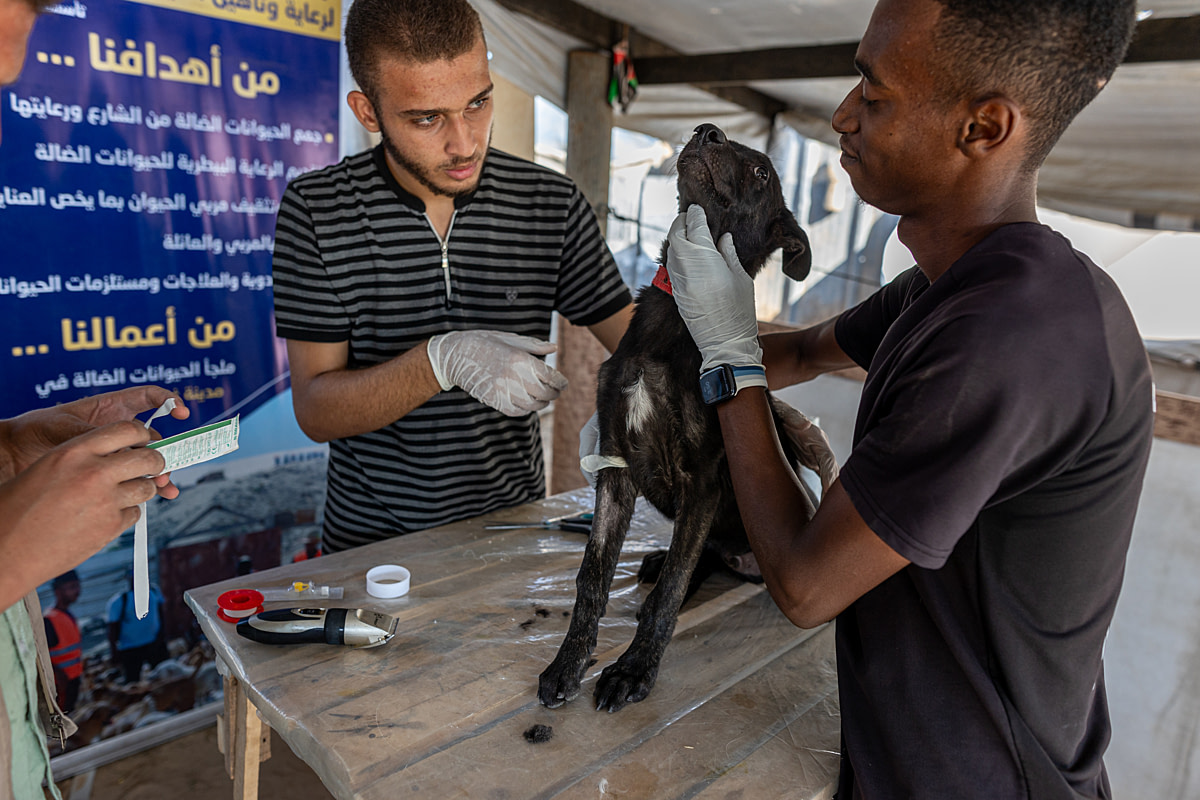
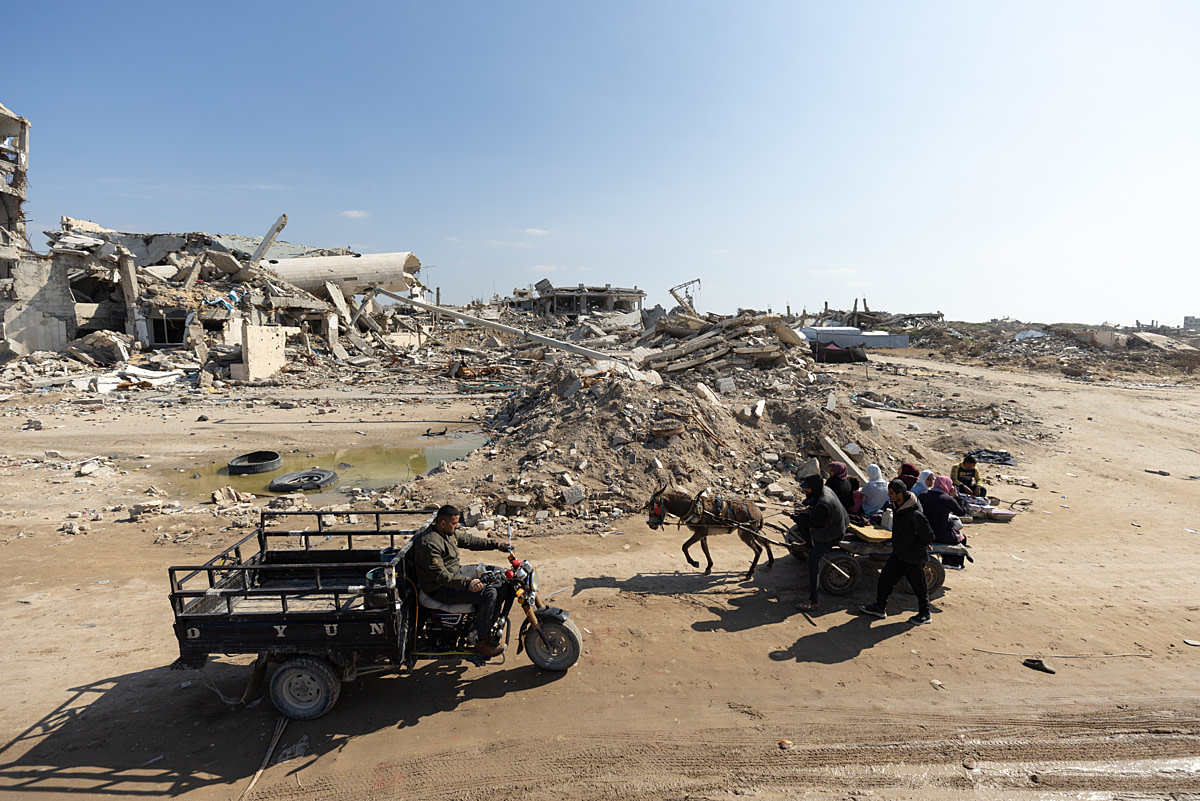
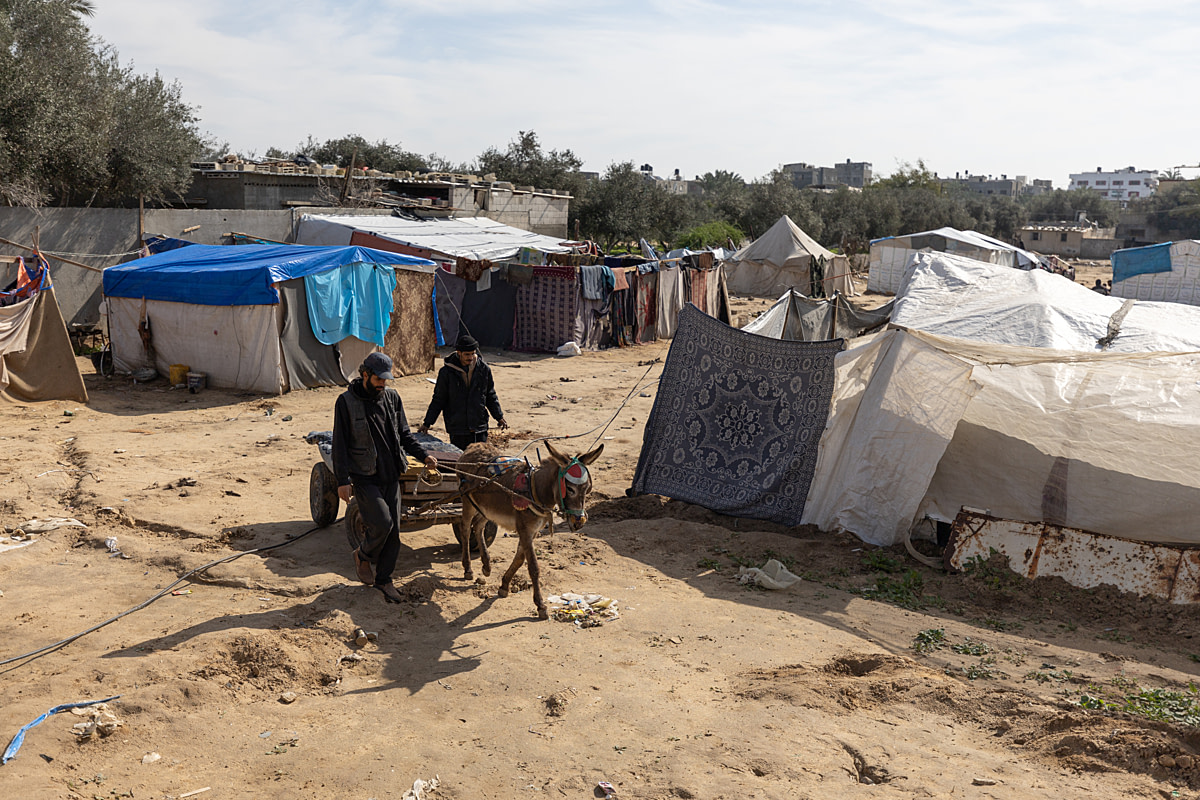
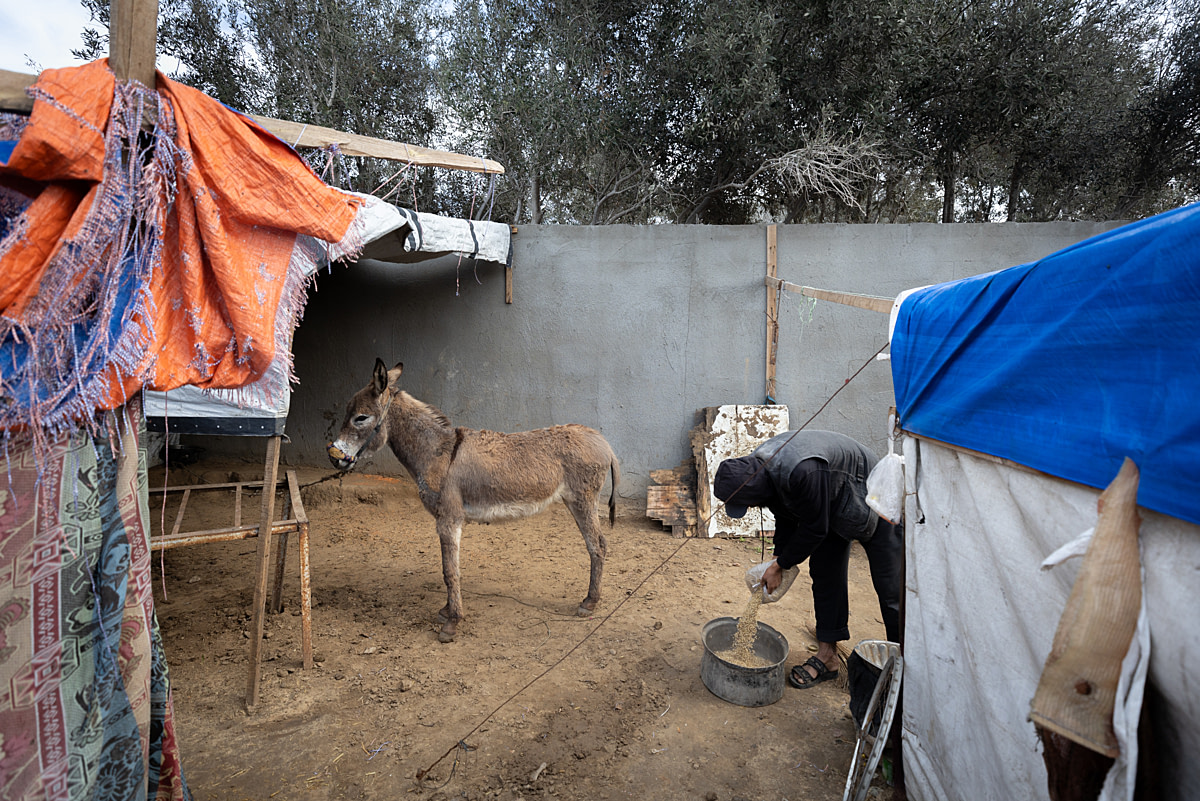
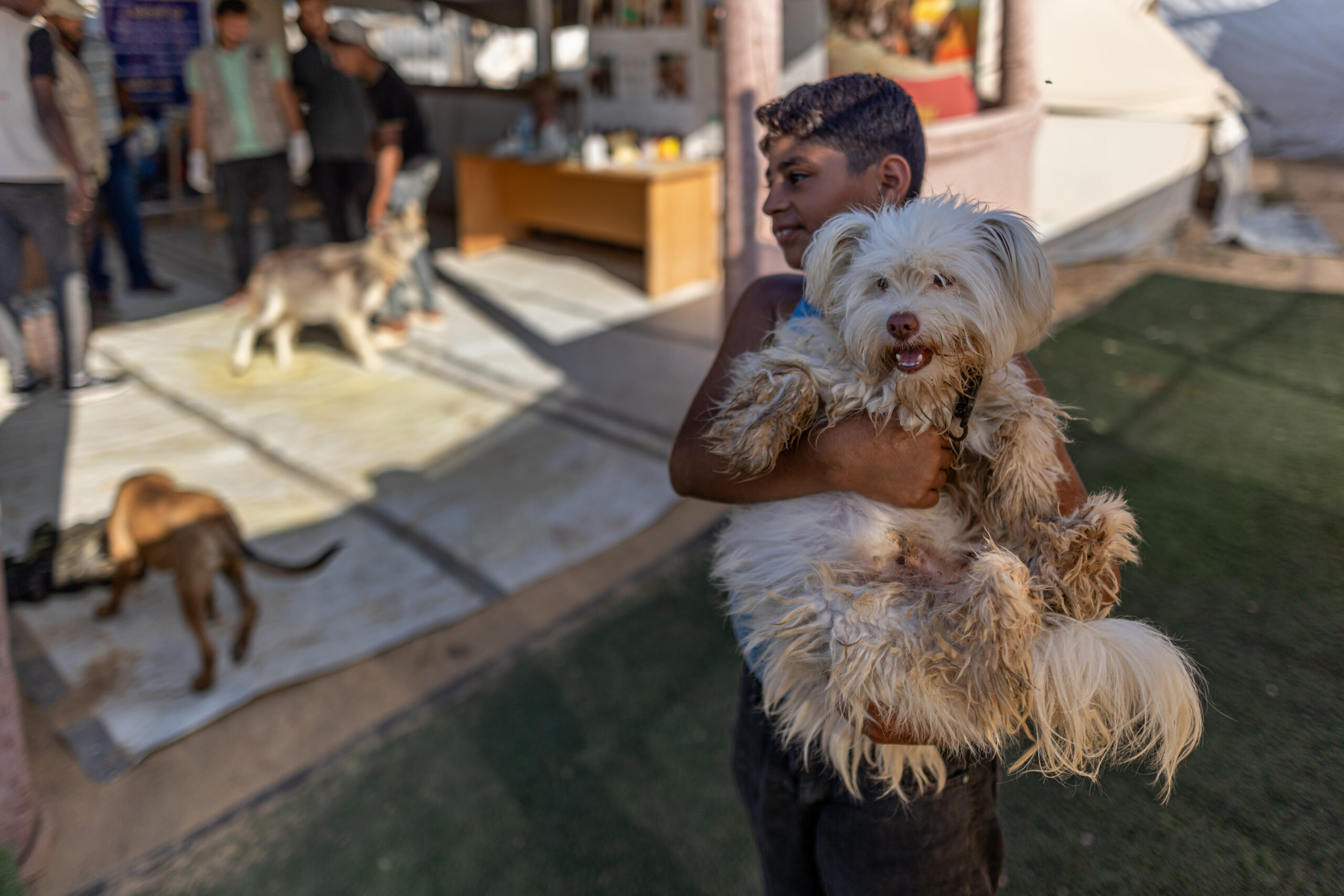
On the beach, Rouh keeps running—a flash of hope, reminding Sa’ed that healing is possible here, and that the soul of Gaza is still very much alive.
Photographer: Mahmoud Abu Hamda
Story in collaboration with Sanctuary Doc, a nonprofit multimedia project telling visual stories of compassion for animals amidst our world’s biggest challenges.
Help share the stories of animals in warzones. Explore and download these visuals and more via the We Animals Stock Site.

